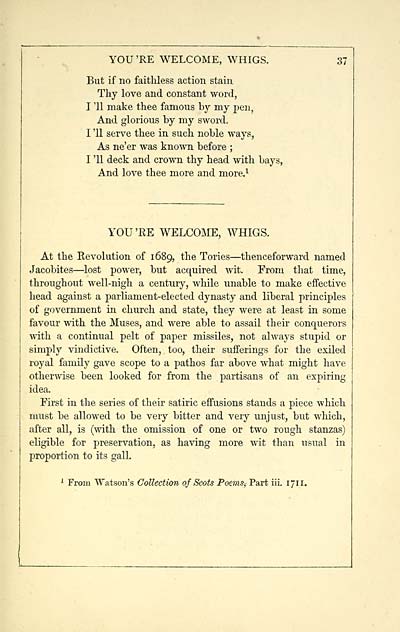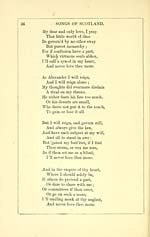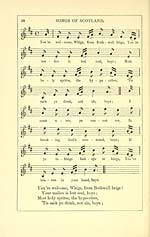Glen Collection of printed music > Printed text > Songs of Scotland prior to Burns
(41) Page 37 - You're welcome, Whigs
Download files
Complete book:
Individual page:
Thumbnail gallery: Grid view | List view

YOU 'RE WELCOME, WHIGS. 37
But if no faithless action stain
Thy love and constant word,
I '11 make thee famous by my pen,
And glorious by my sword.
I '11 serve thee in such noble ways,
As ne'er was known before ;
I '11 deck and crown thy head with bays,
And love thee more and more, 1
YOU'RE WELCOME, WHIGS.
At the Revolution of 1689, the Tories — thenceforward named
Jacobites — lost power, but acquired wit. From that time,
throughout well-nigh a century, while unable to make effective
head against a parliament-elected dynasty and liberal principles
of government in church and state, they were at least in some
favour with the Muses, and were able to assail their conquerors
with a continual pelt of paper missiles, not always stupid or
simply vindictive. Often, too, their sufferings for the exiled
royal family gave scope to a pathos far above what might have
otherwise been looked for from the partisans of an expiring
idea.
First in the series of their satiric effusions stands a piece which
must be allowed to be very bitter and very unjust, but which,
after all, is (with the omission of one or two rough stanzas)
eligible for preservation, as having more wit than usual in
proportion to its gall.
1 From Watson's Collection of Scots Poems.j Part iii. 171 1.
But if no faithless action stain
Thy love and constant word,
I '11 make thee famous by my pen,
And glorious by my sword.
I '11 serve thee in such noble ways,
As ne'er was known before ;
I '11 deck and crown thy head with bays,
And love thee more and more, 1
YOU'RE WELCOME, WHIGS.
At the Revolution of 1689, the Tories — thenceforward named
Jacobites — lost power, but acquired wit. From that time,
throughout well-nigh a century, while unable to make effective
head against a parliament-elected dynasty and liberal principles
of government in church and state, they were at least in some
favour with the Muses, and were able to assail their conquerors
with a continual pelt of paper missiles, not always stupid or
simply vindictive. Often, too, their sufferings for the exiled
royal family gave scope to a pathos far above what might have
otherwise been looked for from the partisans of an expiring
idea.
First in the series of their satiric effusions stands a piece which
must be allowed to be very bitter and very unjust, but which,
after all, is (with the omission of one or two rough stanzas)
eligible for preservation, as having more wit than usual in
proportion to its gall.
1 From Watson's Collection of Scots Poems.j Part iii. 171 1.
Set display mode to: Large image | Transcription
Images and transcriptions on this page, including medium image downloads, may be used under the Creative Commons Attribution 4.0 International Licence unless otherwise stated. ![]()
| Special collections of printed music > Glen Collection of printed music > Printed text > Songs of Scotland prior to Burns > (41) Page 37 - You're welcome, Whigs |
|---|
| Permanent URL | https://digital.nls.uk/90576230 |
|---|
| Description | Scottish songs and music of the 18th and early 19th centuries, including music for the Highland bagpipe. These are selected items from the collection of John Glen (1833 to 1904). Also includes a few manuscripts, some treatises, and other books on the subject. |
|---|
| Description | The Glen Collection and the Inglis Collection represent mainly 18th and 19th century Scottish music, including Scottish songs. The collections of Berlioz and Verdi collected by bibliographer Cecil Hopkinson contain contemporary and later editions of the works of the two composers Berlioz and Verdi. |
|---|

